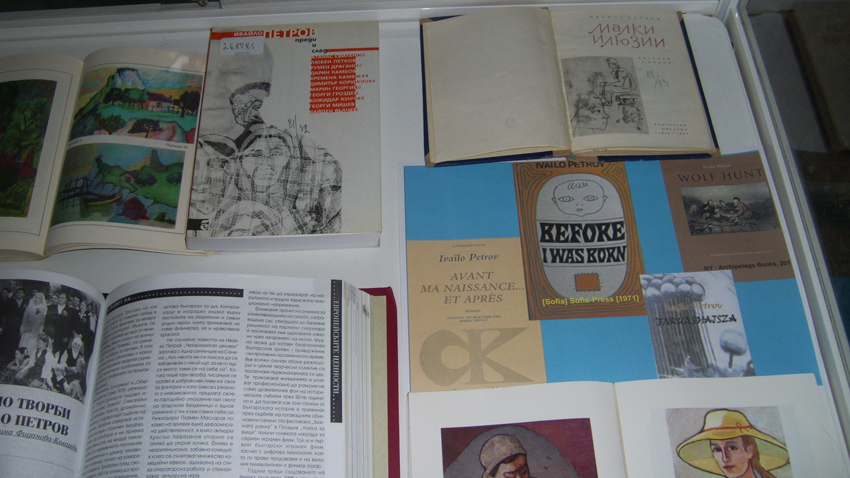“When Ivail oPetrov’s novel “Wolf hunt” came out in 1985, people were stunned, they didn’t know whether the authorities wouldn’t suppress it. That was a few years before the societal changes in the country. Yet, the novel won the battle for a place under the sun, turning Ivailo Petrov into a classical author of that age of socialist Bulgaria. He is the man who told the truth about those times, and he told it bluntly, unsparingly, without idealizing any of his characters,” with these words literary critic Prof. Mihail Nedelchev described the writer’s literary heritage.
On 19 January this year, Ivailo Petrov would have turned 95. And though he is no longer among the living, he lives in the hearts of the reading public. A great many people came to the Sofia City Library to celebrate the books he wrote and the pictures he painted.

“Ivailo Petrov’s memory can be celebrated in many different ways. It can be the memory of a human being, or the memory of an author of immense stature, the kind of author he was throughout his writing career, starting with the novellas “Nonka’s love”, “Groundswell”, “Before I was born and afterwards”, but most of all his novel “Wolf hunt”, says Prof. Nedelchev and adds:
“Wolf Hunt” molded Ivailo Petrov into the foremost classical author of Bulgaria’s most modern literature. It is a landmark book, a book that atones for the sins of other leading authors who were influential in their own time, but who made compromises with their work in the 1950s and 1960s. Ivail oPetrov’s book is unsparing, yet it was written with love of the people in Bulgaria. It is not satire, it is not grotesque. It is a book that is tragic, a book capable of taking anyone reading and comprehending it up to a higher level. I have spent a lot of time with Ivailo Petrov, we worked together at “Bulgarski pisatel,” (Bulgarian writer) publishers. Every time we met it was a challenge, because he was a man who expected so much from any conversation. Words meant a lot to him and he would brook no compromise with meaning. But he also liked to tease and he loved humour, though not the hollow, senseless kind of banter, but a sharp wit. He would never roar with laughter, he spoke softly and was always attentive to what the other person was saying.”
Literary critics say of Ivailo Petrov that all of his books are much loved and very popular with readers. But interest in “Wolf hunt” was immense as soon as it was released.
“With this novel Ivailo Petrov left the age of socialism behind, imbuing these 45 years with a different kind of meaning, offering his own critical view of events,” says Prof. Nedelchev. “The novel showcases a complex model of geopolitical thinking, as demonstrated by the model of the Dobrudzha farm which the neighbouring villages are out to destroy. A farm – wherever it may be – is something ordinary peasants rise against. Therein lies the principal conflict in Ivailo Petrov’s book, but it reaches out far beyond that to show how ideology can turn man into beast. How ideology, in all of its brutishness and pseudo-humaneness can make human beings violent and make murderers out of them, how all this destroys the fabric of our society. Ivailo Petrov loves rural life and knows it well, he knows the complex social processes unfolding in the 1950s, 60s and 70s, but “Wolf hunt” is a scathing indictment of life in the village, with its conservatism and its so-called traditional morals. Such an environment can be a talented man’s undoing, and there are examples of that happening. One of the grimmest thing that can happen to any of us is to have empty times in our lives. They are black holes which devour us – us, as individuals, and society as such. In this Ivailo Petrov has given us the standard, the signs and the stories, so we can all learn from the past.”
English version: Milena Daynova
Photos: Gergana ManchevaAwakener/enlightener - a person who, through his actions, ideas or creative work, awakens the spirit of the people, preserves and spreads national identity, culture and education. In Bulgarian history, this term is most often associated with the period of..
For the twenty-third year, the Bansko Film Fest team will take the audience to some of the most extreme corners of the world with 75 films from 39 countries . ''All of them are premieres, and for some of them, the screenings in Bansko will be..
The 38th edition of the Cinemania (Kinomania) Film Festival will kick off in Hall 1 of the National Palace of Culture in Sofia tonight, November 13. The cinematic panorama opens with the newest feature film by director Milko Lazarov, Tarika ,..
The sculpture “Sand Nativity in Burgas”, which artists Paul and Remy Hoggard are sculpting in the center of Burgas in front of the..
The Natalia Simeonova Foundation has filed documents for registration of a community center that will be named after the legend of Bulgarian rock music..

+359 2 9336 661
